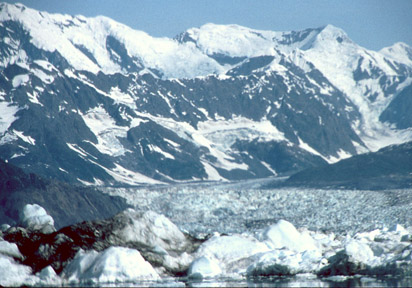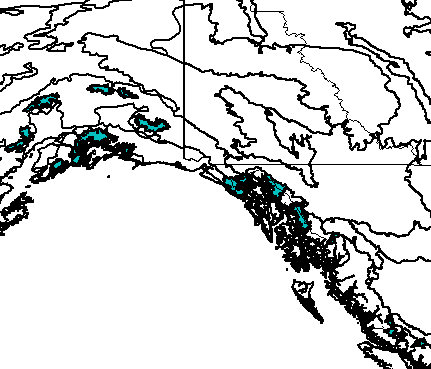
glacier entering Prince William Sound, near Valdez, Alaska (c) 2005 Scott and Ruth Bassett
Bioimages home (click on an image to enlarge)
view
this page in its intended navigation context
Rock and ice

glacier entering Prince William Sound, near
Valdez, Alaska
(c)
2005 Scott and
Ruth Bassett

Source of bioregions data:
Olson, D. M. and
E. Dinerstein. The Global 200: Priority ecoregions for global conservation. (PDF
file) Annals of the Missouri Botanical Garden 89:125-126.
Distinctiveness (1=highest,4=lowest): N/A
These areas are covered by permanent glaciers and unvegetated rock. These
areas are present at the top of high peaks, although large glaciers may flow to
the sea near the coast.
Conservation Status (1=most endangered, 5=most
intact): N/A
Because of lack of living communities, species in these areas are not threatened, although
global climate change is resulting in the decrease of glaciated areas.*
Some views from the ecoregion
Denali National Park, Alaska

glaciers atop Mt. Ranier
(c) 2005 Carol and Steve Baskauf
hires
Portage Glacier, Alaska

Glacier entering Cook Inlet
(c) 2005 Carol and Steve Baskauf
hires
Plain of Six Glaciers, Banff National Park, Alberta


left: crevases in glacier, right: lateral moraines
left after the retreat of the melting glacier
(c)
2005 Scott and
Ruth Bassett
hires
hires
* Ricketts, T.H., E. Dinerstein, D.M. Olson, C.J. Loucks, et al. (1999) Terrestrial Ecoregions of North America: A Conservation Assessment. World Wildlife Fund - United States and Canada. Island Press, Washington, D.C. pp. 337-340.